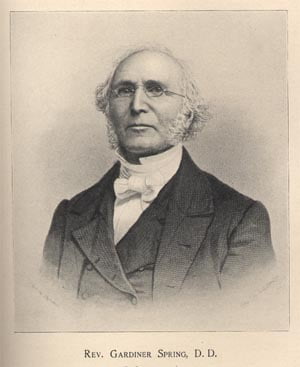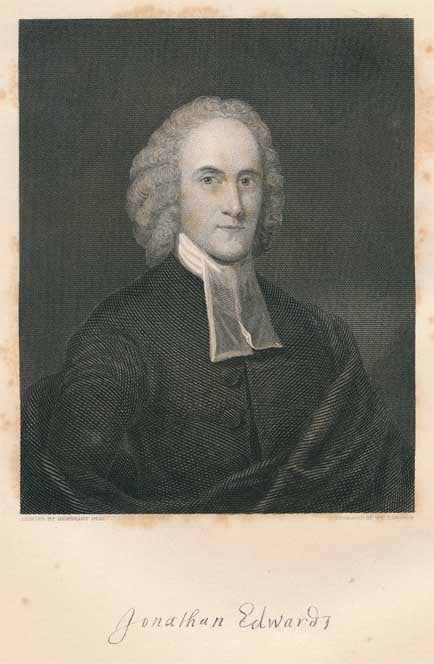This Day in Presbyterian History:
Calvary was his hiding place
 It must be some sort of record. Think of it! The pastor ministered all sixty-three years in the same church. And those six decades were through some of the momentous years in our nation, to say nothing, of the history of the Presbyterian church.
It must be some sort of record. Think of it! The pastor ministered all sixty-three years in the same church. And those six decades were through some of the momentous years in our nation, to say nothing, of the history of the Presbyterian church.
Born in Newburyport, Massachusetts on February 24, 1785, Gardiner Spring attended Berwick Academy in Maine. He then went to and graduated from Yale University in 1805. Married the following year, he and his new bride Susan moved to Bermuda where Gardiner Spring taught the classics and mathematics. This was only for some income, as his real purpose was to study law. And he was admitted to the bar in New Haven, Connecticut in 1808. Receiving a call to the ministry, he went to Andover Theological Seminary for one year and was called to the Brick Presbyterian Church in New York City in 1810, never to leave its pulpit.
It was an active pulpit for the minister. After 40 years of ministry, it was said that he had preached 6000 sermons, received 2092 into the membership roll, baptized 1361 infants and adults, and married 875 couples. Along the way, he had written also 14 books, at least one of which is still being printed today. If the reader doesn’t posses “The Distinguishing Traits of Christian Character,” he is urged to buy one immediately. It answers the question as to how do we know we have eternal life.
Many Christians, and especially those in our Southern states are aware that it was Gardiner Spring who authored the resolutions in 1861 to place the Presbyterian Church (Old School) solidly behind the Republican administration of Abraham Lincoln. That action split the Presbyterian Church into two — North and South Old School. We will consider on May 16 the pros and cons of that resolution.
For now, consider the following words in a letter of Gardiner Spring, just nine years after he had begun his ministry at Brick Presbyterian. On occasion of his birthday, he wrote:
“Still in this world of hope! In defiance of all sins of the past years, and a guilty life, I am permitted to see another birthday. I have been often surprised that I am suffered to live. Blessed be God, I am not afraid to die, and often more afraid to live. I am an abject sinner, and it will indeed be wonderful grace if I ever sit down with Christ at the Supper of the Lamb. That grace is my strong refuge; Calvary is my hiding place. I hope in the grace and guardianship and faithfulness of that omnipotent Redeemer, to be kept from falling and presented faultless before the presence of his glory with exceeding joy. This text has often comforted me, when I have been afraid of trusting in the divine mercy. ‘The Lord taketh pleasure in them that fear him, in those that hope in his mercy.’ It affords me unutterable pleasure to feel that I am not denied the privilege of laying my own soul beneath the droppings of the same blood I have for nine years recommended to my dying and guilty men.”
Words to Live By: We should take the opportunity which a birthday gives to us, as well as other proverbial milestones in our lives, to meditate on the grace of God in Christ in our lives, as well as the work of sanctification which the Holy Spirit is doing within those lives.
Through the Scriptures: Numbers 25 – 27
Through the Standards: Original sin conveyed
WLC 26 — “How is original sin conveyed from our first parents unto their posterity?
A. Original sin is conveyed from our first parents unto their posterity by natural generation, so as all that proceed from them in that way are conceived and born in sin.”
For further reading:
• “Something Must Be Done” — Must reading! A sermon on the subject of revival, delivered by Rev. Spring in 1816, six years into his ministry at the Brick Church [PDF file].
• The Gardiner Spring Resolutions of 1861.
Image source: The Encyclopedia of the Presbyterian Church, by Alfred Nevin (1884).
Sermon text : The digital format of the sermon “Something Must Be Done” was prepared by the staff of the PCA Historical Center, working from an original copy preserved at the Center.

